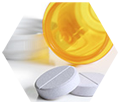
Medications Can Increase Blood Pressure

Some medications can increase your blood pressure because:
- They interact with your existing blood pressure medicine to prevent them from working properly.
- They just do that. Especially if you have high blood pressure to begin with, certain medications (see below) can make blood pressure rise to dangerous levels.
Four Everyday Drugs That Can Make High Blood Pressure Worse:
- Non-steroidal Anti-inflammatory Drugs (NSAIDs)
- Examples include Ibuprofen (Advil, Motrin), and Naproxen (Aleve, Naprosyn)
- These are pain relievers or anti-inflammatory agents.
- Cold medicines can contain these NSAID drugs along with decongestants, which can make blood pressure worse in two ways:
- Decongestants may make your blood pressure and heart rate rise.
- Decongestants may prevent your blood pressure medication from working properly.
- Pseudoephedrine (Sudafed) is a specific example of this.
- Migraine Headache Medications
- A common way that migraine medications work is by constricting blood vessels. This may help your migraine pain, but it is also constricting blood vessels! Obviously, this squeezes the same amount of blood into a smaller space, making your blood pressure spike.
- Weight Loss Drugs
- Appetite suppressants can increase your blood pressure.
Just Be Safe
If you're on any medication at all, let your doctor know. Be sure to point out the concern over possible adverse drug interactions.